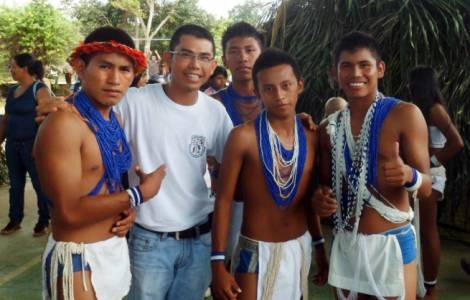
ans
Ciudad Bolivar (Agenzia Fides) - "Despite all the limitations that the environment imposes on the evangelizing mission among indigenous communities, there is great pastoral vitality and significant efforts to continue on paths that go beyond the colonizing mentality, which considers the native only as the recipient of pastoral action and assistance, without sufficiently recognizing his condition of missionary discipleship, as well as his cultural values, his visions of the world and his spirituality, in which the presence of God is also manifested". This is what emerges from the final message of the first National Meeting of Indigenous Pastoral Care in Venezuela, which was held in Ciudad Bolívar, Bolívar State, from March 2 to 5, 2023.
This meeting, promoted by the National Missionary Council (COMINA) and by the Department of the Missions of the Venezuelan Episcopal Conference, was the first after the celebration of the Synod for the Amazon, although the Meetings of indigenous peoples and missionaries (ENIMIS) had taken place for years.
Among its objectives, the meeting was an opportunity to get to know each other better, to share stories of missionary service in indigenous communities and to discern new ways and presences inspired by the Holy Spirit in the current context. Indigenous pastoral agents from Venezuela participated and shared the experiences of their respective ecclesiastical circumscriptions.
The final message, addressed "to the indigenous peoples, to our brothers and sisters who share with us the faith in Jesus Christ, to our pastors, priests and bishops of Venezuela", published yesterday, recalls the meeting held in Ciudad Bolívar, on the banks of the majestic Orinoco River, where lay people, consecrated persons, priests and bishops have gathered who belong to indigenous communities or accompany them in their experience of faith and in the defense of their human and cultural dignity.
"We acknowledge with gratitude the evangelizing action of the missionaries who preceded us, write the participants in the meeting, and we thank the Lord for the generous witness of so many men and women who gave their lives so that the Gospel and the gifts of Jesus Christ be known among our native peoples". Then they continued: "We believe that, as pastoral reality demands and as the Holy Father suggests in Querida Amazonia (85-90), indigenous peoples are called to become co-responsible subjects for the evangelization of our brothers and sisters, assuming the various ministries that the Church confers on them and those that derive from their own culture, which can be assumed at the service of the proclamation of the Gospel and the growth of the Christian community".
The call for help from our indigenous peoples, who see their human dignity threatened by numerous situations such as the devastation of their territories of origin, mining extractivism, pollution of rivers, abuses by the authorities, human trafficking of young girls and women, the precariousness of health care, drug trafficking and the presence of irregular groups, among other realities, also resounded during the meeting.
Hope comes from young indigenous lay people and seminarians, as well as priests and nuns, children of these peoples, "who give an indigenous face to our Christianity".
The bishops present at the meeting, who share the joys, sufferings and hopes of these peoples, as well as the whole Church, are invited to "continue to trust the indigenous peoples"
and to accompany them in living their baptismal vocation as missionary disciples, "May God grant us to continue to build together a ministry at the service of the fullness of life of the indigenous peoples!" (SL) (Agenzia Fides, 9/3/2023)
 ASIA/CHINA - Catholic communities visit the families of priests and nuns ahead of the Lunar New Year
ASIA/CHINA - Catholic communities visit the families of priests and nuns ahead of the Lunar New Year